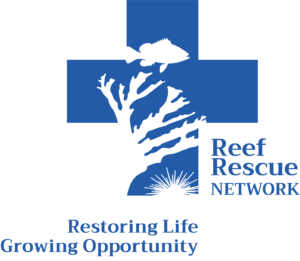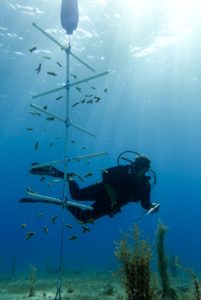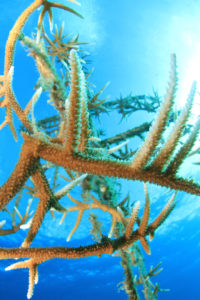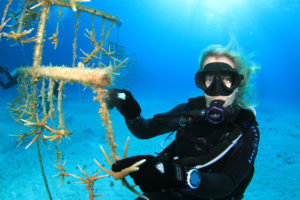The Perry Institute for Marine Science is a not-for-profit organization committed to protecting our oceans through research that both inform the public and encourage action, ultimately improving the understanding and stewardship of our oceans. Our programs focus on improving our understanding of the issues facing our oceans, working with governments to develop management strategies and improve decision-making and educating the next generation of marine scientists. Supporting a wide range of research including Marine Protected Areas, Fisheries Management, Marine Species, Climate Change and recently with the development of the Reef Rescue Network.
Reef Rescue Network
To increase capacity for coral restoration The Perry Institute for Marine Science (PIMS) has created the Reef Rescue Network, a partnership between Coral Reef Scientists and local partners consisting of Community Organizations, NGOs and Dive Operators. The Reef Rescue Network coordinates coral nursery establishment, maintenance, management, outplanting and monitoring with its partners. Specifically, we assist with developing and implementing criteria for restoration, nursery site selection, harvesting coral from source populations, growing corals in nurseries, outplanting corals to reefs and monitoring the success of restoration at multiple scales from individual corals to ecosystem health. The work also includes research for the breeding and dispersal of coral larvae, research on longspined sea urchins (Diadema antillarum), parrotfish and other key species on coral reefs as well as reef surveys to assist with the creation of Marine Protected Areas for protecting coral reefs. We are providing opportunities to build partnerships between scientists, marine resource managers, conservation practitioners, and businesses and coastal communities that depend on healthy reefs and during 2018 we have already established 30 Coral Nurseries throughout The Bahamas. We are now extending out into the Caribbean and beyond. Our network aims to raise awareness to local communities and visitors about the importance of coral reefs and what they can do to help stop further deterioration. Healthy restored corals play an important role in tourism and recreational fishing, two important income sources for coastal communities.
Coral Nurseries
Coral nurseries are an important component to marine conservation, as they provide a collection of species that can be added to the reef to help regenerate areas that are stressed or damaged. Coral restoration using Coral Nurseries is a very promising new science. Slow growth rates of coral were once thought to limit our ability to restore corals reefs however it has since been shown that different corals grow at different rates and in favorable conditions can grow much faster than in natural conditions on reefs. The initial ideas behind coral nurseries were to help create and grow new reefs, and to help coral reefs recover from physical damage such as boat anchors, and climate change induced coral bleaching. Over the last few years many areas of coral reef have been rejuvenated with corals grown from a nursery and have created new habitats for marine life. Outplanted corals have even spawned which is a huge indicator to the positive effects this type of coral rehabilitation can have and how it can help to restore huge tracts of reef. By increasing population numbers and the numbers of distinct parent genotypes through propagation and outplanting of nursery grown fragments, sexual reproduction and recruitment are expected to have higher success rates ultimately aiding in the natural recovery of the species. Consideration of genetic factors is essential because long-term success of restoration efforts may be influenced by genetic and genotypic diversity of restored coral populations. Many different species of corals can and are being grown in nurseries all over the world.
Image by: Melissa Altenburger Image by: Stuart Cove’s Dive Bahamas
Several nursery designs have been developed for growing corals. Each design provides different benefits based on each location’s specific environmental conditions and project goals. While Midwater nurseries have proven to be successful for growing several species of branching corals, other experimental techniques such asMicrofragmentation and Spawning show great promise for a wide range of species. Midwater nurseries come in many styles and can be like ‘washing lines’, table structures that grow corals above the seafloor, or floating PVC frames that suspend corals off PVC arms called ‘tree’ nurseries. Corals grow well on midwater floating nurseries as they have ideal conditions. They are far from sediment, predators and competitors and their structure is kept clean from algae, sponges and tunicates by divers. This allows for much quicker growth.Currently one of the most popular nurseries is the ‘tree’ design. This tree is anchored to the seabed and often made using PVC pipes, joints, rope and a float to keep it suspended in the water column. Once they have grown large enough (usually 6 – 12 months for branching corals), corals in the nursery can be outplanted to repopulate the reef. Corals may either be put on the reef intact as they come off the nursery or fragments may be cut off to outplant with the original piece left to regrow. It has been noted that with each ‘pruning’ of these corals they grow faster producing corals quicker each time known as propagation.
PADI Reef Rescue Diver Specialty Course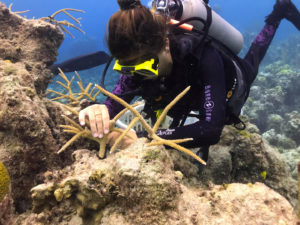
PIMS and PADI Course Director Hayley-Jo Carr have developed a PADI Reef Rescue Diver Specialty Course that is being taught by Dive Shops throughout the Reef Rescue Network. You must be certified as an Open Water Diver and be at least 12 years old. The course takes one day and consists of knowledge development and two open water dives at a Coral Nursery.
This specialty is an introduction to coral nursery diving, to familiarize divers with the skills, knowledge, planning, organization, procedures, techniques and enjoyment of coral nursery diving. The Reef Rescue Diver Specialty Course allows PADI Instructors to educate divers about coral nurseries, including essential facts about coral reefs, threats facing corals, coral nurseries function and how to maintain coral nurseries.
What you will learn:
- What corals are.
- The different ways corals feed and what gives them the most energy.
- How corals reproduce.
- Common types of corals found in the Caribbean.
- Why coral reefs are important.
- The threats to coral reefs both globally and locally.
- Steps to help protect and rehabilitate coral reefs.
- What the function is of coral nurseries.
- How to maintain a coral nursery.
- What problems can occur in a coral nursery and how they can be fixed.
- How to outplant corals from a nursery back onto the reef.
- How to choose a suitable outplanting site.
- What the future for coral restoration and reef rehabilitation looks like.
- The Reef Rescue Network.
Once certified you may volunteer throughout the Reef Rescue Network.
Get in touch:
- If you are a business interested in joining the Reef Rescue Network and establishing your own Coral Nursery.
- If you are a PADI Instructor wanting to become a PADI Reef Rescue Diver Instructor.
- If you are an Open Water Diver wanting to become a PADI Reef Rescue Diver.
Contact our Training Director & Coordinator Hayley-Jo Carr – hayley.carr@perryinstitute.org
REEF RESCUE NETWORK WEBSITE COMING SOON!!!! END OF 2018!!!!

